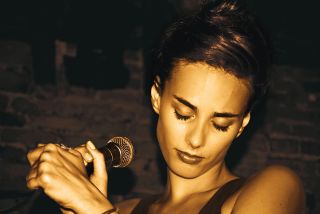Eccentric's Corner: A Voice of Her Own
Sophie Auster breaks out from a famous family.
By Katherine Schreiber Cullen published January 1, 2012 - last reviewed on December 21, 2020
Daughter of renowned authors Paul Auster and Siri Hustvedt, songbird Sophie Auster barely had time to get comfortable in her own skin after a record she made at age 16, "for grandma's Christmas stocking," led to her playing Paris jazz clubs, posing for magazines, and shooting several films, all while enrolled as a freshman at Sarah Lawrence College. Now the 24-year-old—whose voice may remind you of a Fiona Apple-Dusty Springfield blend—epitomizes the young artist's universal struggle to find a unique identity, no matter who else has helped her onto center stage.
From the outside, it seems as if you have everything: beauty, talent, successful parents. Do you feel that you have it all?
I can't say that I'm not a very lucky girl. But what I'm doing ain't easy. I'm working on a record by myself and I'm not getting paid. It's a daily struggle.
What makes it so hard?
Not having anyone to guide you. I'm on my own now and it's scary. It takes discipline to sit in a room and write lyrics all day, especially when you have no appointments, no rehearsals, no structure. You have to say to yourself, Something's going to come out of this. It's not just about having talent. It's almost all about perseverance.
What keeps you going?
I believe I have something worthwhile. If you're going to do this type of work you have to think that. Otherwise, what's the point—why would someone else get behind you?
Growing up, did you feel pressure to emulate your parents?
No. Not at all. In fact, I'm grateful to have two parents who have made it as artists. It's a really nice model for me: They did what they love and they never gave up on it. It was a long road for them as well. I also didn't have an understanding of their recognition until quite late in my life. Their success was always strange and abstract to me—especially because they were writers: In the U.S., writers are kind of pushed to the side. There's more pomp and circumstance around actors and singers.
Are you drawn to that pomp and circumstance?
I have never been motivated by fame. Music and acting are my passions and I do them because I feel like I have to and there is no other option for me.
How are you different from your parents?
I'm more extraverted than they are. To be on stage and have the stamina to be in front of a lot of people is totally different from what's at the heart of writing a book. My parents are alone in their rooms all day, thinking. I'm alone too when I'm writing lyrics, but the way I present my work is not the same as how my parents present theirs. Books can go out into the world and stay hidden away. Performers can't.
What obstacles have you faced?
Leaving my former music manager. It was the end of a big relationship; it felt like I was breaking up with a boyfriend. Everyone is going to say something different and have an opinion about what they like, what they don't like, who they want you to be. If you invite all of this in, you're just going to end up confused. I've had to learn not to let people's opinions get inside my head too much.
What's the harshest criticism you've heard?
During my freshman year at Sarah Lawrence, some really mean things were written about me on a couple of blogs, like, "She sucks; the last thing this school needs is another singer/song-writer." I think I invited it. I was trying on a different guise for myself that was a little more pretentious and stuck up than I really am. People called me obnoxious. It was crushing. I wanted people to like me.
How did hearing that feedback affect you?
I had been on this high after my first album got picked up abroad. Traveling around, performing, thinking, F*** school, I'll just do whatever I want. It was humbling when people said I was obnoxious. It put into perspective that the attitude I was trying on wasn't really working, that I needed to grow up, get to know myself better, and take part in the real world. So one of the first things I did was take school more seriously.
How do you think you've grown as a singer since then?
I used to be a lot more self-conscious, obsessed with how I looked and sounded, rather than in touch with what I felt. I'm less concerned now with proving I have a nice voice, and I'm more focused on experimenting with its potential as an instrument. It comes from being well-rehearsed, having put in the effort, and having more experience: I can trust myself to let go now. I can own my instincts without being afraid of ugliness or imperfection. And yeah, sometimes this lends itself to funny things, like I spaz out with my arms or riff off a chorus. But that freedom to be inside of what you're doing—rather than outside, judging—makes for the best performances.
How do you perceive your own attractiveness?
I don't think people can ever really see themselves clearly. Sometimes I feel really beautiful and other times I think I look quite weird. Proving yourself to enough people makes worrying about how you look less important.

